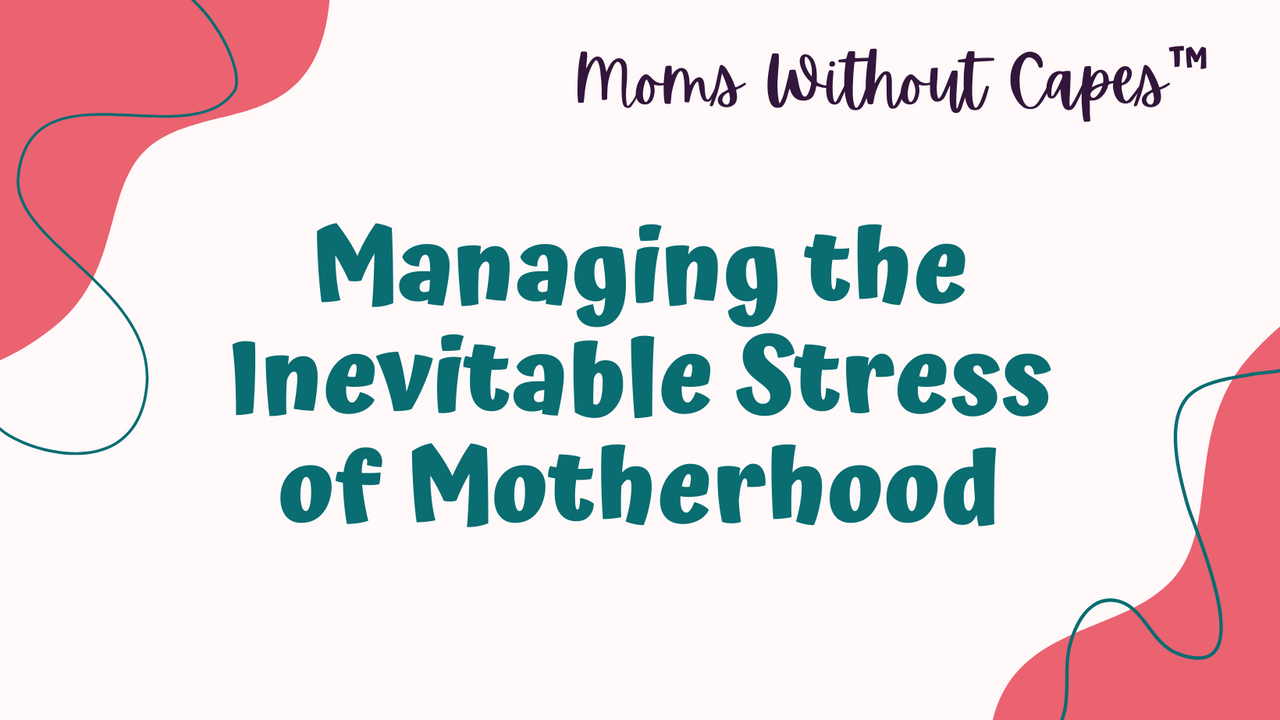Managing the Inevitable Stress of Motherhood

Stress: It’s part of life and while we would love to live a “stress-free” life, it’s highly unlikely, if not impossible that you’ll ever get there. So, what we need to do is learn how to effectively manage the stress we do experience so that it doesn’t cause adverse effects on our health and well-being. This is possible.
What Exactly is Stress?
Is there such a thing as good stress or is it all bad and harmful? Stress is a state of mental or emotional strain resulting from demanding circumstances. It is a burst of energy that can create a lot of tension if not managed in a healthy way.
Believe it or not, not all stress is necessarily bad. You likely have experienced stressful moments that have motivated you to meet specific goals or to rise to challenges. When we feel a certain level of stress, we often feel motivated to get tasks accomplished. Stress actually boosts memory and keeps us safe.
Not all stress is necessarily bad.
Our body releases helpful hormones in response to stress which allow our senses to get laser focused so that we can respond accordingly to any threatening stimuli. Some studies have shown that moderate levels of stress can improve the function of our heart and protect the body from infection. In other words, stress, in small amounts, actually works to improve our immune system.
Dangers of Too Much Stress
However, when we experience too much stress, it can definitely have an adverse effect. “Too much” is a relative term for the amount and intensity of stress that depends on the individual, his/her coping skills, resiliency level, past experiences, and other factors. When we learn how to manage our stress and increase our coping skills, we can prevent stress from harming us.
Too much stress can end up weakening our immune system while also leading to high blood pressure, increased fatigue, depression, and anxiety. It can cause irreparable damage to your heart and really slow down your metabolism which as we know, leads to weight gain.
The symptoms of excessive or extremely intense stress can vary greatly. It can manifest with memory issues, frequent sickness, headaches, and muscle tension. If you are noticing changes in appetite, either eating more than you usually do or way less than you usually eat, then it could mean you have too much stress and there’s a need to deal with it. Changes in sleep are another sign. Finally, racing thoughts and increased irritability can signal that there is too much stress in your life.
How do you Manage Stress?
Of course, prevention is always best. Making sure you are giving yourself space to practice self-care which means having regular times during the day to pursue passions, recharge your battery, simply giving yourself time to hear yourself think and be fully present in the moment. Meditation is an excellent tool for preventing stress from taking over your life.
Prevention is always best, but not always possible.
Moving your body also helps to process stress. Engaging in regular exercise is self-care and is good for the body, mind, and soul. Multiple studies have shown that there is a powerful link between exercise and mental health. If walking on a treadmill isn’t for you, try something new and exciting… take a dance class, learn kickboxing, challenge a friend to beat your step-count, sign up for a Spartan race. The point is, just move. It’ll help you keep your stress levels at bay.
There is a powerful link between exercise and mental health.
Learn how to properly relax. One thing I noticed when I ask people how they relax, they often say on the couch with Netflix. This is not the ideal way to relax. Yes, you may be resting your body, but your mind is digesting all that you are consuming on the television. True relaxation is a technique, one that needs to be practiced, to get the full effect of being rested. To bring your body, mind, and spirit to a state of total relaxation is something that can and should be mastered as a stress prevention tool.
Get on a regular sleep schedule and work to improve both the quantity and quality of your sleep. Not only are you less likely to be stressed out while you are sleeping, while you are sleeping, your body is healing the damage imposed by stress. There are ways to deal with the worries that inflict you and keep you from getting a good night’s sleep and if you are interested in learning more about this, ask me. If you are struggling with sleep, there are resources available to help you.
Much of the stress we experience happens in our minds. Remember, what we think about a situation affects our response more than the situation itself. It’s why two people can have completely different reactions to the same situation, simply because we bring our unique perspectives to the situation. It’s also why one person can experience a situation as being extremely stressful while another person can seem to bounce back from the same situation without being stressed in the least!
Two ways to help with getting a handle on any given situation that is likely to elicit a stress response is to shift your perspective or to focus on the moment at hand. To shift your perspective, pull yourself out by considering the whole picture. Often, we feel more stressed when we zero in on “all the things.” By zooming out and asking yourself, will this matter in the long run, in one week, one month, or even one year or by drawing your focus on what you have control over can both help with managing any stress caused by the situation.
Ask yourself, will this matter in the long run? Probably not.
Practicing mindfulness can help as well, by bringing your attention to the present moment. There are situations that are outside of our comfort zone, that’s inevitable and just simply part of life. But we can center ourselves and decrease the amount and intensity of stress we experience by using our senses to tune into ourselves. This can help especially when you feel pulled in many different directions at once. Learning how to ground yourself in the present can be helpful with managing stress.
Finally, reach out for help. Most likely you have a support system and if you do not, there are groups and people who want to support you. The catch is, you have to recognize what it is you need help with and take action to seek it out. Stress can wreck havoc on your health, your well-being, your relationships, and your life. As we both know you are 100% responsible for your own life and managing the inevitable stress that is bound to happen as part of living is your responsibility. Be proactive and you will thrive.
Let's talk about it...
What situations trigger your stress the most? What areas in your current life feel heavy and what symptoms do you notice that may be signs that you need to be more proactive with managing the stress? What steps do you need to take to minimize and manage the stress in your life?
Join my Facebook community to engage with other moms who are discovering and falling in love with who they are under their Super-Mom cape! Click here.






